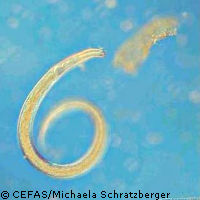Deep-sea biodiversity closely linked to ecosystem functioning, study finds
A loss of biodiversity in the deep sea could severely damage its functioning as an ecosystem, warn scientists in a report that will be published in the upcoming issue of the journal Current Biology. After recent studies had indicated a close relationship between biodiversity and ecosystem functioning on land, the scientists involved studied the biodiversity of nematode worms as well as other independent indicators of ecosystem functioning and efficiency (such as total faunal biomass and organic matter decomposition) at 116 deep-sea sites around the globe. The diversity of nematodes, which make up more than 90% of life in the benthic zone of the sea (its lowest level), has been found to be a reliable gauge for the diversity of other species. The results suggest that those sites with a greater nematode diversity exhibit exponentially higher rates of ecosystem processes (e.g. production, consumption, and transfer of organic matter to higher levels of the food chain, decomposition of organic matter, and regeneration of nutrients) and efficiency. Furthermore, the scientists infer that some species make these environments more habitable for other species. Generally speaking, the relationship between diversity and ecosystem functioning appears to be exponential in the marine environment, while on land it has been shown to be linear, suggesting complementary relationships between species. 'For the first time, we have demonstrated that the deep-sea ecosystem functioning is closely dependent upon the number of species inhabiting the ocean floor,' says Roberto Danovaro of the Polytechnic University of March, Italy, the main author of the study. 'This shows that we need to preserve biodiversity, and especially deep-sea biodiversity, because otherwise the negative consequences could be unprecedented. We must care about species that are far from us and essentially invisible.' 'Deep-sea ecosystems provide goods (including biomass, bioactive molecules, oil, gas, and minerals) and services (climate regulation, nutrient generation and supply to the upper ocean, and food) and, for profound involvement in global biogeochemical and ecological processes, are essential for the sustainable functioning of our biosphere and for human wellbeing,' the researchers conclude in the article. 'Our results suggest that the conservation of deep-sea biodiversity can be crucial for the sustainability of the functions of the largest ecosystem on the planet.' The research was funded by the EU as part of the Hotspot Ecosystem Research on the Margins of European Seas (HERMES) programme, as well as the European Science Foundation (ESF) under the EUROCORES Biodiversity and Ecosystem Functioning in Contrasting Southern European Deep-sea Environments (BIOFUN) Programme. Its findings will contribute to the EU Network of Excellence Marine Biodiversity and Ecosystem Functioning (MarBEF). The article, which has already been released online, will be published in Current Biology on 8 January.



